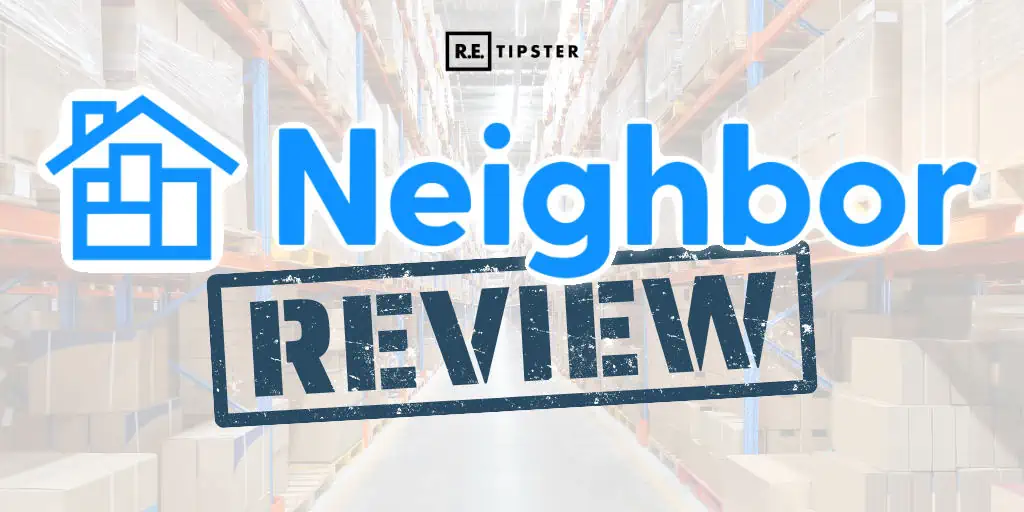
With over 11% of U.S. households renting at least one storage unit, self-storage rents reached an all-time high last year.
Clearly, there’s plenty of demand for self-storage. But a corporate storage facility isn't the only option.
Described as the “Airbnb for storage space,” Neighbor offers a peer-to-peer storage and parking platform. But is it safe and secure? How much does it cost? How does it earn revenue?
If you have extra storage or parking space—or are looking for it yourself—consider Neighbor.com.
Neighbor.com Review
Summary
Neighbor.com offers an intuitive platform connecting hosts with extra parking or storage space with renters who need it.
The peer-to-peer platform comes with plenty of protections for hosts and renters alike, along with automated payment processing. Not everyone will appreciate the
Pros
- Host Protections
- Free Listings
- Host Verification
- Automated Rent & Late Fee Processing
- Renter Protection Plans
- Better Bargain than Storage Facilities
Cons
- Can’t Pay with Other Means
- Less Convenient Access for Renters
- Greater Potential Risk to Stored Belongings
- Availability Depends on Local Hosts
What Is Neighbor.com?

Hosts rent out their spare garages, basements, attics, or parking pads to renters, letting them earn passive income each month on unused space. Renters get a bargain on storage space or parking.
Like Airbnb, hosts create listings with photos, descriptions, and amenity listings. The latter could include features like climate control or separate access. Renters browse local listings and connect with hosts to ask questions about their available space.
All of which sounds great, cutting out corporate storage facilities and connecting neighbors with complementary needs. But when you dig into the details, plenty of questions sprout up about exactly how it works.
How Neighbor.com Works
You get the big picture: prospective storage or parking space renters browse listings with photos and descriptions. And parking does make up a hefty portion of the listings on Neighbor.com, not just for cars but also for boats, RVs, trucks, ATVs, and other vehicles.
Here’s exactly how Neighbor.com works, both for hosts and renters.
Allowed and Prohibited Storage
Renters can’t just store whatever they want in the garage down the street. That radioactive plutonium will have to go somewhere else.
Neighbor.com prohibits the following items from being stored:
- Firearms and ammunition
- Fireworks and other explosives
- Toxins and pesticides
- Controlled substances
- Perishable food items
- Waste
- Stolen items
Renters must disclose exactly what’s being stored at the host’s property, and the host has the right to inspect stored items.
Finally, renters may not live or work at spaces rented on Neighbor.com. Phroggers should look elsewhere.
Rent Payments
The greatest strength and drawback of Neighbor.com is its payment platform.
Renters make payments through Neighbor.com’s built-in payment platform (powered by Stripe). They typically pay through automated recurring credit card payments each month. Late rent fees are also automatically charged to the renter’s credit card.
Which is great—except you don’t have a choice. All storage and parking leases through Neighbor.com must use their payment platform for rent.
Why? Because that’s how Neighbor.com earns its revenue.
Neighbor.com Fees
Both hosts and renters pay fees to Neighbor.com.
The fee for hosts is simple enough: 4.9% of all payments collected, plus $0.30 per transaction. That covers credit card processing fees and then some.
Renters also pay a fee, but it varies per lease. When you go to reserve a space, you can see the service fee before committing. While Neighbor.com doesn’t explicitly share how these fees are calculated, they typically range from 15% to 20% of the rent.
Renter Protection Plan
Actually, fees aren’t the only way Neighbor.com makes money.
Neighbor also earns revenue by selling protection plans to renters. They offer three plan levels: Minimum, Moderate, and Standard. You set the coverage amount, and Neighbor prices the premium accordingly.
Neighbor pays out a maximum reimbursement of 90% of the repair or replacement cost for belongings.
Sound a lot like insurance? Neighbor insists they don’t sell insurance, probably for some legal liability reason, but the distinction is lost on me.
Read more about renter protection plans here.
Cancellations and Refunds
If a renter cancels their reservation before the host accepts it, within 24 hours of acceptance, or more than three days before the reservation starts, they get a full refund of both the rent and the Neighbor.com service fee.
Renters who cancel their reservation one to three days before it starts receive an 80% refund of the rent (but not Neighbor’s service fee). On or after the start date, renters don’t receive any refund if they cancel.
Hosts can cancel a reservation any time before the lease start date. They can non-renew contracts with 30 days' notice and can, of course, evict non-paying renters’ belongings.
Host Identity Verification
To list their space on Neighbor.com, hosts must verify their identity.
Neighbor partners with Persona to verify hosts’ identities. The process is mostly automated, where hosts use their webcam (or phone camera) and a photo ID to verify their identity. Read more about the identity verification process here.
It protects renters from real estate scams, and Neighbor.com does not store any sensitive identity information, as the verification happens entirely through Persona.
Host Liability and Payout Protection
Neighbor provides a Host Guarantee with up to $1 million in liability protection. It includes bodily injury and “third-party property damage (excluding host and renter property damage) related to your Neighbor storage reservation.”
As a more mundane protective measure, Neighbor pays out up to two months of lost rental income if the renter stops paying and you need to evict their stuff. They refer to this as Host Payout Protection, and it’s a nice feature to entice wary would-be hosts.
Renter Access to Storage
When hosts create a rental listing, they set the frequency at which the renter can access the space.
That could be 24/7, of course, for spaces with their own separate entrance. Or hosts can set more restrictive access to areas that require the host’s presence, such as attic storage that requires the renter to enter the host’s home.
Business Uses
Neighbor also markets to businesses for a range of flexible uses.
For example, Neighbor connects companies with vehicle fleets to parking lot owners. They also help retail property owners fill vacancies on a temporary or flex basis, perhaps while they wait for longer-term tenants. In a head-scratching nomenclature, they call these “Retail REITs” despite bearing no resemblance to real estate investment trusts.
Pros of Neighbor.com
There’s a lot to like about Neighbor.com. Upsides to the peer-to-peer leasing platform include:
- Host Protections: Between the Host Guarantee and Host Payout Protection, hosts can sleep easy at night. As for what renters store in their homes or other storage space, hosts can inspect it to make sure they feel comfortable.
- Free Listings: Since Neighbor.com makes most of its money on rent payment transactions, hosts can test the waters by posting listings for free to see if anyone bites.
- Host Verification: Renters can trust that a host is who they claim to be, as all hosts must verify their identity before listing their space.
- Automated Rent and Late Fee Processing: With payments automated on credit cards, hosts and renters alike can “set it and forget it.”
- Renter Protection Plans: Renters storing valuable items can protect them with a policy directly with Neighbor.com or buy their own insurance policies elsewhere.
- Better Bargain than Storage Facilities: Renters can typically find better deals on storage and parking spaces by renting directly from another individual than paying a business.
Cons of Neighbor.com
No platform is perfect. Beware of the following drawbacks when considering Neighbor.com as a renter or host.
- Can’t Pay with Other Means: When you use Neighbor.com, you agree only to transact payments on their platform. You can’t make or receive payments in cash or through free platforms like PayPal or Venmo. It’s how Neighbor.com earns its revenue, after all!
- Less Convenient Access for Renters: Most self-storage facilities offer 24/7 access, or at least access from early morning to late at night. When renting space on Neighbor, you agree to the host’s access conditions.
- Potential Risk to Stored Belongings: Self-storage facilities and commercial parking venues typically provide strong security. That almost always includes surveillance cameras, physical barriers such as fences or walls, and, in some cases, human security guards. Your neighbor’s garage doesn’t come with that level of security.
- Availability Depends on Local Hosts: As a peer-to-peer platform, you can only rent space through Neighbor.com if someone in your area happens to have listed it. While major cities have pretty wide usage, less densely populated areas may not have any listings at all.
How Neighbor.com Compares
For renters, Neighbor.com offers the potential to score a bargain. Or not—you may find that after Neighbor’s fee, it costs just as much as renting space from a self-storage or parking facility with more convenient access and better security.
Renters should compare pricing and availability on Neighbor.com with SpareFoot, a parking and storage listing aggregator. It compares all commercial storage or parking options in your area with excellent search filters.
For hosts, Neighbor.com is the only peer-to-peer storage service I’m aware of (other than StashBee in the UK). But would-be hosts have plenty of other ways to house hack and monetize their home.
They can rent out rooms to housemates, of course, or rent out an accessory dwelling unit. Or if they’re willing to move, they can follow the tried and true multifamily house hacking model. Every one of those options can generate more revenue than renting out storage space, albeit with more costs or headaches on your part as a host.
Alternatively, you could rent out parts or all of your home as a short-term vacation rental. A friend of mine used to rent out a bedroom/bathroom suite in her apartment on Airbnb, and she found that if she rented it for two long weekends each month, it covered most of her rent. My cousin rented her entire home out on Airbnb, and just crashed with her fiance whenever someone booked it. Again, more hassle, but far more income as well.
Another option for peer-to-peer renting is Turo, the “Airbnb of cars.” You can rent out your car, for a few days or weeks at a time. In fact, when I travel home to the U.S., I usually rent a car on Turo. It potentially comes with greater risk and headaches, but again, it can generate more income than renting out storage space.
Final Thoughts
Renting out storage space is as passive as passive rental income gets in most cases. You throw a few photos and sentences in a listing, give someone a key when they drop off their boxes of college notebooks, and you don’t see them again for another year or two.
And it doesn’t pay particularly well, in most cases.
Still, if you have spare parking or storage space that goes unused each month, you have little to lose by renting it out.
Renters can also potentially score a great bargain by renting garage space from someone a few streets down rather than a public parking garage or self-storage facility.
Another option to explore for flexible, cost-effective storage and parking is Spacer, a platform offering similar peer-to-peer storage and parking services, allowing you to rent out or find extra space in your area.
Whichever side of the transaction you find yourself on, make sure you understand the risks and costs before committing to a lease agreement.
















